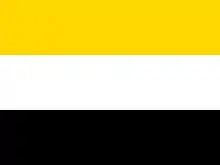Garifuna Americans
Garifuna Americans or Black Carib Americans are Americans of African and Indigenous descent with origins from Honduras, Guatemala, Belize and Nicaragua and trace their ancestry to Saint Vincent And The Grenadines.[2] As of 2012, Abrazo Garifuna in New York, an event celebrating the contributions of Garifuna Americans to New York City is in its second year.[3] Abrazo Garifuna in New York continues to be held annually as of 2014.[4][5]
  | |
| Total population | |
|---|---|
| 963,930 (2018)[1] 0.29% of the U.S. population (2018) | |
| Regions with significant populations | |
| Languages | |
| American English, Garifuna, Spanish language | |
| Religion | |
| Predominantly Roman Catholic Minority Protestantism | |
| Related ethnic groups | |
| other Afro Caribbean, West Indian, Caribbean American, Afro Honduran, Afro-Guatemalans, Garifuna, Afro-Nicaraguans, Black Carib. |
Garifuna transnational activism in New York City
Cultural Anthropologist of the African diaspora, Sarah England, has written one of the first ethnographies in a monograph length on the transnational migration of Garifuna Central Americans to New York City, "Afro Central Americans in New York City: Garifuna Tales of Transnational Movements in Racialized Space" (Gainesville: University Press of Florida, 2006 ISBN 978-0-81302-988-7). England examines the ways in which the experiences of transnational migration affect the social movements of the Garifuna in both Central America and New York City. She centers her analysis on family relations, community dynamics, economic practices, history, and grassroots organizing of one particular Garifuna transnational community with members traveling between and living in Limón, Honduras and New York City. Her narrative takes place in the 1990s on how Limón became the center of Garifuna organizing when members of that community challenged the practices of a Honduran large landowner and the National Agrarian Institute through the formation of an agricultural cooperative and ethnic social movement called El Movimiento Negro Iseri Lidawamari (Black Movement New Dawn). England's ethnography highlights the complexities of diasporic identities are defined both against and through notions of territoriality, nation, and indigeneity; such identities are defined against territoriality in the sense that they privilege the solidarity and identity of the geographically dispersed diaspora over the territorial nationalism of the countries of residence of its members. For Garífuna, the politics of diaspora are complex because they have several different homelands and different relationships to them: from the mainly symbolic relationship to Africa and St. Vincent to the more immediate relationship to Central America.[6]
Notable people
| Lists of Americans |
|---|
| By U.S. state |
| By ethnicity or nationality |
|
|
- Brian Flores – Football Coach
- O.T Genasis – Rapper
- Evil E - Disc Jockey
- Abe Laboriel Jr., - musician
References
- "B03001 HISPANIC OR LATINO ORIGIN BY SPECIFIC ORIGIN - United States - 2018 American Community Survey 1-Year Estimates". U.S. Census Bureau. 1 July 2018. Retrieved 25 November 2019.
- Turin, Mark (16 December 2012). "New York, a graveyard for languages". BBC News. British Broadcasting Corporation. Retrieved 22 December 2012.
- "Senator Ruben Diaz to celebrate the 2nd "Abrazo Garifuna in New York"". New York State Senate. 15 March 2012. Retrieved 22 December 2012.
- "Senator Ruben Diaz to celebrate the 3rd "Abrazo Garifuna in New York"". New York State Senate. 20 March 2013. Retrieved 19 November 2014.
- "State Senator Ruben Diaz Sr. ABRAZO GARIFUNA 2014". 100percentbronx. 15 March 2014. Retrieved 19 November 2014.
- England, Sarah. "Transnational Movements, Racialized Space", Afro Central Americans in New York City: Garifuna Tales of Transnational Movements in Racialized Space. Gainesville: University Press of Florida, 2006: 29.
Further reading
- Chaney, James. "Malleable Identities: Placing The Garínagu In New Orleans." Journal of Latin American Geography 11.2 (2012): 121-144. Academic Search Complete. Web. 20 June 2015.
- Matthei, Linda M., and David A. Smith. "Flexible Ethnic Identity, Adaptation, Survival, Resistance: The Garifuna In The World-System." Social Identities 14.2 (2008): 215-232. Academic Search Complete. Web. 20 June 2015.
- Swain, Liz. "Garifuna Americans." Gale Encyclopedia of Multicultural America. Ed. Jeffrey Lehman. 2nd ed. Vol. 1. Detroit: Gale, 2000. 686-697. Gale Virtual Reference Library. Web. 20 June 2015.